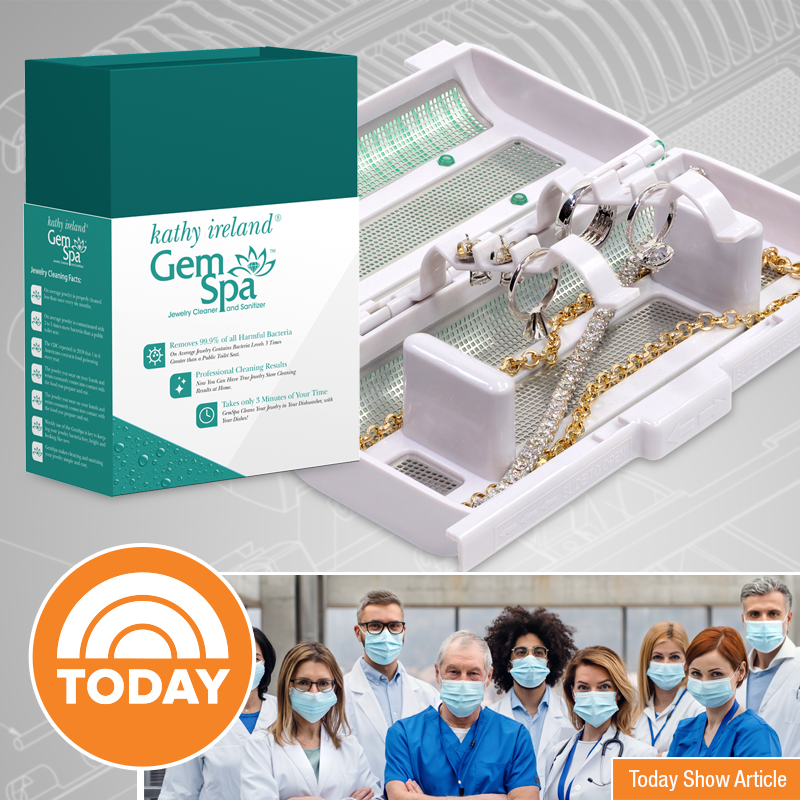Should you give your rings a break? How jewelry could hide germs
There's a reason why doctors usually avoid wearing jewelry while working.
April 30, 2020, 3:26 PM EDT / Source: TODAY
By Aly Walansky
Besides social distancing, hand washing and sanitizing has become among the chief form of self-protection to slow the spread of COVID-19. But while everyone is trying to be better about frequently washing their hands, are they giving their jewelry the same treatment?
Medical professionals have long avoided wearing jewelry on their hands in sanitized environments. “Wearing rings and keeping our hands clean and less likely to spread infection has been studied over the years, especially with regards to surgical wounds and scrubbing before surgery,” Dr. Erum Ilyas, a board-certified dermatologist in the greater Philadelphia area, told TODAY Style. “Most surgical suites have rules that prohibit the use of rings or even nail polish out of concern for bacteria embedding in microscopic imperfections in jewelry or chipped nail polish."
However, Ilyas shared that some studies have shown that rings are cleaned with hands when washed with soap and water or hand sanitizer. And the standards for health care professionals will always be higher than the general public. “It is routine practice in the health care environment for us to maintain every aspect of hygiene possible by reducing and eliminating any possible reservoir for infection. Most surgeons, doctors and nurses will wear their jewelry on a necklace or tied to their scrubs during procedures,” said Ilyas.
Of course, the studies Ilyas is referring to were performed on bacteria — not viruses. “Viruses are much smaller than bacteria and could potentially linger,” Ilyas explained.
Skin irritation poses risks
All the additional hand washing and sanitizer use can cause skin irritation when paired with jewelry, potentially leaving you more vulnerable to infection. “Although your ring may not be transferring viruses around after washing, if there are tiny cracks or breaks in your skin that are perhaps concentrated around your jewelry, then you may be leaving yourself more susceptible to viruses attaching to your skin after contact with potentially infected surfaces,” said Ilyas.Should we give our rings and bracelets a vacation?
It’s a good time to consider giving jewelry a break for a while. Avoiding jewelry on the hands and wrists is a way to minimize irritation to the skin that can leave it more susceptible to viruses as well as decrease the surfaces that viruses can attach to. But for people who don’t want to stop wearing their jewelry, there are ways to keep rings clean without compromising safety or ruining jewelry.
Safely cleaning jewelry
“Before the worldwide pandemic hit, we typically recommended regular cleanings of your jewelry using warm, soapy water and a toothbrush for application,” Kate Maller, jewelry designer behind Kate Maller Jewelry boutique in Denver, told TODAY.
An unused, clean toothbrush is great for getting into all those tight spaces, which typically harbor most of the bacteria, like under cracks and prong or pave set stones, said Mailer. “That setting style leaves tiny spaces or gaps between some parts of the stone and the prongs or metal where particles can get logged and stuck,” said Mailer.
Cleaning your jewelry is something people sometimes overlook, but it’s coming into contact with everything our hands and bodies come in contact with, and that includes germs and bacteria. “Whatever you touch it touches, too,” said Mailer. “Now that can start to feel pretty scary, period, especially when you think about it in relation to COVID-19.
“After much research and consulting with a local physician, we feel confident in recommending the same cleaning routine that we always do: warm, soapy water — don't skip on soap, either — and a toothbrush,” said Mailer.
Here's why: This particular virus is made up of pointy spires, giving the virus the appearance of wearing a sort of crown (which is where the word" corona" in "coronavirus" comes from), but underneath that is the protective layer made up of lipids, meaning fat. “Is the soap you're using strong enough to get fat, like bacon grease, off of your pan or dishes? If the answer is yes, it's good enough (as long as) you're scrubbing long enough to get through a round of the ABCs,” said Mailer. If the answer is no, then opt for a soap you know can handle the task."
You might be thinking, "OK, so my jewelry is dirty but is it really that dirty?" The answer is, likely, yes. “Everything from food to fecal matter can get stuck in the sweaty and moist places in between parts of your jewelry and even in between your skin and your jewelry (think wedding bands),” said Mailer.
While cleaning, be gentle
It’s easy to think aggressive scrubbing will be the best way to keep rings clean but remember that some stones, unlike diamonds, are soft stones. “They are prone to cracking and scratching so make sure that toothbrush doesn't have aggressively sharp or pointed bristles or you risk damaging your beloved heirloom,” said Mailer.

